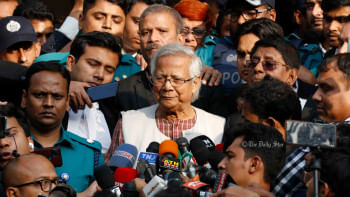18 candidates have liquid assets worth over Tk 100cr: TIB
As many as 18 candidates for the upcoming national election have liquid, movable properties worth over Tk 100 crore each, found Transparency International Bangladesh.
They include Jute Minister Golam Dastagir Gazi with Tk 1345.77 crore, independent candidate SAK Ekramuzzaman with Tk 421.16 crore, prime minister's Private Industry and Investment Adviser Salman F Rahman with Tk 315.76 crore, and AL candidate Abu Zafar Mohammad Shafi Uddin with Tk 306.68 crore.
They are contesting from Narayanganj-1, Brahmanbaria-2, Dhaka-1, and Cumilla-8 respectively.
Movable or liquid assets refer to wealth like bank deposits, fixed deposits, postal certificates, government bonds, and cash in hand. It excludes assets like land or real estate properties.
TIB released these findings at a press conference in their office today. They found these by analysing affidavits submitted to the Election Commission.
Candidates possessing between Tk 200-300 crore in liquid assets include Yusuf Abdullah Harun from Cumilla-3 (Tk 277.61 crore), Dilip Kumar Agarwala from Chuadanga-1 (Tk 276.19 crore), Abdul Momin Mondol from Sirajganj-5, (Tk 253.24 crore) and Gazi Golam Mortoza from Narayanganj-1 (Tk 233 crore).
Md Sirajul Islam Mollah from Narsingdi-3, Md Sayed Khokon from Dhaka-6, Abdul Kader Azad from Faridpur-3, Afruza Bari from Gaibandha-1, Selima Ahmed from Cumilla-2, Mahmuda Begum and Md Abdullah from Lakshmipur-4, Finance Minister AHM Mustafa Kamal, Nur Mohammed from Jamalpur-1 and Dewan Zahid Ahmed from Manikganj-2 all have between Tk 100-200 crore in movable wealth.
Advocate Sultana Kamal, human rights activist, said, "The affidavits give us a picture of widening inequality within the country and this is not a good message. Only a handful are witnessing development, and they will be sitting in the parliament. This will lead to a situation of tyranny of the minority over the majority."
TIB Executive Director Dr Iftekharuzzaman said the wealth statements should be analysed. "The Election Commission, Anti-Corruption Commission (ACC) and National Bureau of Revenue can analyse these even after elections. Lawmakers can be brought to the book even after election if irregularities are found."
"The ACC say that they only investigate based on specific complaints, but they can take up suo moto investigations," he said.

 For all latest news, follow The Daily Star's Google News channel.
For all latest news, follow The Daily Star's Google News channel. 




Comments